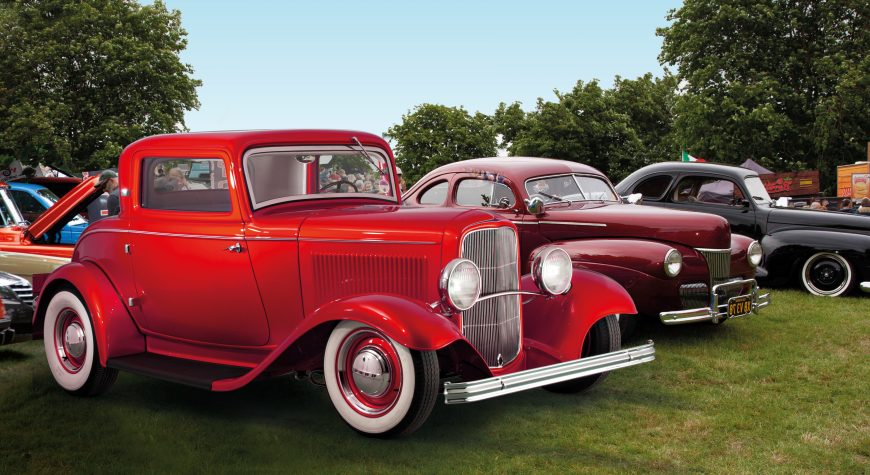A
Auto Express
Guest
Walking into a showroom when you’re in a position to buy a new car can be daunting, with countless different incentives, offers and ways to pay to comb through. Once you’ve got your head around that, you’ll still need to deal with the dealer, but does haggling really work?
With the average new car sold in the UK costing about £33,000, getting money off wherever possible can really help your bank balance. Below we lift the lid on the tips and tricks that you can use to make sure you walk away from the garage with the right car for you, at the right price.
Product knowledge
Knowledge is power, and rarely more so than when you’re buying a new car. Sales staff are expected to know all about the products they’re selling, but memorising every tiny fact and feature about a wide range of models is hard.
It’s likely that by the time you’re visiting the dealerships, you’ll have narrowed your shortlist to a fairly small number of cars. If you can learn more about these models than the dealer is likely to know, you’ll hold a significant advantage over them, and could save yourself a packet.
• Guide to buying a new car: dealers vs brokers vs car supermarkets
When it comes to the list price and the amount of kit fitted as standard, for example, no two cars are alike. So while Car A might be cheaper, the roof rails and sat-nav you want could be costly options. Car B might have these as standard, and be sold with only a small price premium.

image

image

image

image

image

image

image

image
And don’t forget to look at special editions; these can be loaded with additional features and, if they meet your needs, offer excellent value for money. Use this knowledge to your advantage and a dealer might throw in a free spec upgrade to get you the options you need, or drop the list price on a higher trim level, if they think it will secure the deal.
Know your budget (and stick to it)
Around nine in 10 cars are bought on finance, so knowing your monthly budget is more important than a car’s price, and at least as important as knowing your optional extras.
Dealers offer all manner of incentives to customers, including zero per cent or low-rate finance, paying a guaranteed minimum sum for part-exchange and deposit contributions. You should do the sums to determine which of these is the best deal for you. They’re all aimed at making your monthly payments as low as they can be, and ensure that signing on the line is as appealing as possible for potential buyers.
Whatever deals are on the table, however, keep your monthly budget firmly in mind. If you can afford £325 a month – and no more – don’t allow the dealer to round it up to £350. There is often wriggle-room in the annual percentage rate (APR), which you should push the dealer on, because it’s one of the single most important factors in getting a good deal on your new car.
• Car finance deals explained
If you’re buying on a personal contract purchase (PCP), you’ll also need to know how much deposit you’re able to put down. This figure is critical to determine what your monthly repayments will be. Once again, know how much you have to spend and stick to it.

image

image

image

image

image

image

image

image
You should visit the dealer armed with an ‘aim-to-pay’ price. These can be hewn from a variety of online retailers, as well as other dealers. You shouldn’t fear buying a car over the Internet; walk away from the showroom and buy online if you can’t get a good deal from the dealership.
Dress to impress
While it’s not a job interview and you should feel comfortable, a dealer will use how you dress to build a picture of the kind of buyer you are. This makes more of a difference at some showrooms than others.
One supercar dealer we spoke to told us he’s worked hard to ensure his staff treat all customers equally, after selling a car to a scruffy-looking family who drove to his dealership in an old Ford Mondeo. It transpired that the man had just won the National Lottery and was making his first major purchase.
Another dealer said that a six-figure deal for several commercial vehicles was almost lost to a competitor after the buyer was ignored by his sales staff in the showroom. The customer, who was a builder, was wearing overalls that were covered in cement dust, and was initially dismissed as a time-waster by all but one of the team.
Conversely, it’s not always advisable to wear expensive designer clothing and jewellery, because you run the risk of marking yourself out as a buyer who is willing to spend big. Better, then, to wear smart clothing, but nothing too showy.
Bring your significant other, but leave the kids at home when negotiating
Most dealers we spoke to said there’s little point trying to close a deal if only one half of a couple visits the showroom. A good sales executive will look for a wedding ring and engage customers in general small talk; it’s all part of what the sales industry calls ‘prospecting’.
Few husbands or wives will be willing to commit to such a large purchase without consulting their spouse, and that usually means visiting the dealership to see or test drive the car together. This is especially true of family cars. One thing to watch out for is the dealer playing spouses off against each other, particularly if one half of the couple is emotionally involved in the purchase. If you think this might be happening to you, there’s no harm in telling the dealer you want to sleep on it and return the next day.
• Best new car deals 2019
While it’s best to organise childcare for your kids when negotiating the final deal, you can involve them in buying. Young eyes may spot things you might miss, such as whether there are rear USB ports, and it’s also worth checking if the rear windows are low enough for them to see out of easily.
Visit on a weekday, and at the right time of the year
It’s widely thought visiting a showroom at the end of the month gives you the best chance of securing a deal, but the reverse could actually be true if the dealership or sales executive have already hit their targets.
The beginning of the month may not be much better, either. Many workers are paid at the end of the previous month, so more people are in the mood to buy, and more customers mean fewer discounts will be on offer.

image

image

image

image

image

image

image

image
A better route is thinking about the best month to visit. Most dealerships have ‘quarterly’ targets to hit at the end of March, June, September and December. That means sales managers will be looking to increase the number of cars sold in the preceding few weeks, but will have less focus on it in the first few weeks of the quarter. As a result, you’re more likely to get a deal at the end of a quarter, but less likely at the start of one.
Importantly, these dates are all about when you arrange the deal, so think ahead to plan exactly when you’re going to start visiting dealerships and taking test drives.
You’ll also need to think about the length of time it will take for a factory to build your new car, unless you’re happy to buy a model already in stock. Finally, avoid visiting the showroom at weekends, because it’s when they’re busiest, so you’ll have less of the salesperson’s undivided attention.
Part-ex value won’t be what you expect
If you want to make the most money from your old car, don’t part-exchange; you’re better off selling it privately. But if your purchase relies on you releasing the value of your current model, doing this with the dealer is easy and convenient.
Sales staff will normally use one of two trade price guides, from organisations called CAP and Glass’s, to value your part-ex. These guides give used values of thousands of second-hand models, and the prices can be adjusted to take into account the mileage and condition of your car.
• Best car leasing deals
The garage is unlikely to give you a price based on one of the ‘consumer’ price guides you can buy at your local newsagent, nor will they give you the same price you’ll find on a used-car classified ad site; the dealer will be seeking to maximise the profit from your part-exchange, naturally.

image

image

image

image

image

image

image

image
They may choose to sell it themselves, sell it directly to another dealer, or simply send the car to auction. While that sounds mercenary, you can use it to your advantage when you think about the cost to change.
Cost to change
Cost to change is quite simply the bottom-line cost you’ll need to foot in order to change your car. Many buyers get hung up over discounts or the value of their part-exchange, and the latter can be particularly emotive. But these – and the commission dealers make on finance, warranties, options and accessories – all play a part in the overall deal.
• Buying a used car: your complete guide
You may find one dealer offering an extra £2,000 on your part-exchange, but they could have already inflated the list price of the car you’re looking to buy, or are incentivising sales staff to make up the shortfall elsewhere. Considering the cost to change your car cuts through all of this, making it easy to see just how much your new car will cost. This can be applied whether you’re taking out finance or paying cash.
If it’s the latter, you’ll need to take the on-the-road price, plus the cost of any options or accessories, and then subtract the value of your part-ex. If you’re buying on finance, substitute the on-the-road price for the total amount payable, which you’ll find given on your finance illustration.
What not to do: The cardinal sins of negotiation
We’ve shown you how to get a top deal; now here are the basic mistakes that can cost you money
Never reveal your true budget
At some point in the negotiation process, the dealer will ask what you have to spend on your new car. He or she will take this figure as the starting point for the negotiations, so it’s hard to drop this amount later in the process. If you can afford £350 a month on a PCP deal, tell them it’s £300. If you go straight in at £350, that will be the smallest amount the dealer will try to get you to pay.

image

image

image

image

image

image

image

image
Don’t be rude and defensive
Dealers don’t have a great reputation, but if you treat them with courtesy and respect this will be reciprocated. If you’re rude or aggressive, the salesperson will have less reason to get you the best deal. Be firm, but be friendly with it.
Don’t switch salesmen
If you book an appointment, make sure you meet the right sales executive, and stick with the same person if you visit the showroom on multiple occasions. You’ll build up a rapport with them, and your commitment could mean they go the extra mile for you. Sales staff don’t like to share the spoils of commission, either.
Verbal agreements aren’t worth the paper they’re printed on
A common source of disagreement is when things are promised verbally by the dealer, but not documented in writing, are later not delivered upon. Ask the sales executive to jot down the important parts of the deal so that you have a written reference of what was discussed. If there’s a problem further down the line, then you can then refer back to the documents to check what was said.
Don’t assume your new car will be perfect
Your car should be perfect when you collect it, but don’t assume it will be. Before signing the handover paperwork, go around the bodywork with a fine-toothed comb, looking for any dings, scratches or paint mismatch between panels. Do the same when it comes to checking the spec is exactly what you ordered, then repeat the process with the interior. If you spot any issues, document both the problem, and how the dealer will remedy them, before taking delivery.
How do you haggle when buying a new car? Let us know your top tips in the comments...
Continue reading...
With the average new car sold in the UK costing about £33,000, getting money off wherever possible can really help your bank balance. Below we lift the lid on the tips and tricks that you can use to make sure you walk away from the garage with the right car for you, at the right price.
Product knowledge
Knowledge is power, and rarely more so than when you’re buying a new car. Sales staff are expected to know all about the products they’re selling, but memorising every tiny fact and feature about a wide range of models is hard.
It’s likely that by the time you’re visiting the dealerships, you’ll have narrowed your shortlist to a fairly small number of cars. If you can learn more about these models than the dealer is likely to know, you’ll hold a significant advantage over them, and could save yourself a packet.
• Guide to buying a new car: dealers vs brokers vs car supermarkets
When it comes to the list price and the amount of kit fitted as standard, for example, no two cars are alike. So while Car A might be cheaper, the roof rails and sat-nav you want could be costly options. Car B might have these as standard, and be sold with only a small price premium.

image

image

image

image

image

image

image

image
And don’t forget to look at special editions; these can be loaded with additional features and, if they meet your needs, offer excellent value for money. Use this knowledge to your advantage and a dealer might throw in a free spec upgrade to get you the options you need, or drop the list price on a higher trim level, if they think it will secure the deal.
Know your budget (and stick to it)
Around nine in 10 cars are bought on finance, so knowing your monthly budget is more important than a car’s price, and at least as important as knowing your optional extras.
Dealers offer all manner of incentives to customers, including zero per cent or low-rate finance, paying a guaranteed minimum sum for part-exchange and deposit contributions. You should do the sums to determine which of these is the best deal for you. They’re all aimed at making your monthly payments as low as they can be, and ensure that signing on the line is as appealing as possible for potential buyers.
Whatever deals are on the table, however, keep your monthly budget firmly in mind. If you can afford £325 a month – and no more – don’t allow the dealer to round it up to £350. There is often wriggle-room in the annual percentage rate (APR), which you should push the dealer on, because it’s one of the single most important factors in getting a good deal on your new car.
• Car finance deals explained
If you’re buying on a personal contract purchase (PCP), you’ll also need to know how much deposit you’re able to put down. This figure is critical to determine what your monthly repayments will be. Once again, know how much you have to spend and stick to it.

image

image

image

image

image

image

image

image
You should visit the dealer armed with an ‘aim-to-pay’ price. These can be hewn from a variety of online retailers, as well as other dealers. You shouldn’t fear buying a car over the Internet; walk away from the showroom and buy online if you can’t get a good deal from the dealership.
Dress to impress
While it’s not a job interview and you should feel comfortable, a dealer will use how you dress to build a picture of the kind of buyer you are. This makes more of a difference at some showrooms than others.
One supercar dealer we spoke to told us he’s worked hard to ensure his staff treat all customers equally, after selling a car to a scruffy-looking family who drove to his dealership in an old Ford Mondeo. It transpired that the man had just won the National Lottery and was making his first major purchase.
Another dealer said that a six-figure deal for several commercial vehicles was almost lost to a competitor after the buyer was ignored by his sales staff in the showroom. The customer, who was a builder, was wearing overalls that were covered in cement dust, and was initially dismissed as a time-waster by all but one of the team.
Conversely, it’s not always advisable to wear expensive designer clothing and jewellery, because you run the risk of marking yourself out as a buyer who is willing to spend big. Better, then, to wear smart clothing, but nothing too showy.
Bring your significant other, but leave the kids at home when negotiating
Most dealers we spoke to said there’s little point trying to close a deal if only one half of a couple visits the showroom. A good sales executive will look for a wedding ring and engage customers in general small talk; it’s all part of what the sales industry calls ‘prospecting’.
Few husbands or wives will be willing to commit to such a large purchase without consulting their spouse, and that usually means visiting the dealership to see or test drive the car together. This is especially true of family cars. One thing to watch out for is the dealer playing spouses off against each other, particularly if one half of the couple is emotionally involved in the purchase. If you think this might be happening to you, there’s no harm in telling the dealer you want to sleep on it and return the next day.
• Best new car deals 2019
While it’s best to organise childcare for your kids when negotiating the final deal, you can involve them in buying. Young eyes may spot things you might miss, such as whether there are rear USB ports, and it’s also worth checking if the rear windows are low enough for them to see out of easily.
Visit on a weekday, and at the right time of the year
It’s widely thought visiting a showroom at the end of the month gives you the best chance of securing a deal, but the reverse could actually be true if the dealership or sales executive have already hit their targets.
The beginning of the month may not be much better, either. Many workers are paid at the end of the previous month, so more people are in the mood to buy, and more customers mean fewer discounts will be on offer.

image

image

image

image

image

image

image

image
A better route is thinking about the best month to visit. Most dealerships have ‘quarterly’ targets to hit at the end of March, June, September and December. That means sales managers will be looking to increase the number of cars sold in the preceding few weeks, but will have less focus on it in the first few weeks of the quarter. As a result, you’re more likely to get a deal at the end of a quarter, but less likely at the start of one.
Importantly, these dates are all about when you arrange the deal, so think ahead to plan exactly when you’re going to start visiting dealerships and taking test drives.
You’ll also need to think about the length of time it will take for a factory to build your new car, unless you’re happy to buy a model already in stock. Finally, avoid visiting the showroom at weekends, because it’s when they’re busiest, so you’ll have less of the salesperson’s undivided attention.
Part-ex value won’t be what you expect
If you want to make the most money from your old car, don’t part-exchange; you’re better off selling it privately. But if your purchase relies on you releasing the value of your current model, doing this with the dealer is easy and convenient.
Sales staff will normally use one of two trade price guides, from organisations called CAP and Glass’s, to value your part-ex. These guides give used values of thousands of second-hand models, and the prices can be adjusted to take into account the mileage and condition of your car.
• Best car leasing deals
The garage is unlikely to give you a price based on one of the ‘consumer’ price guides you can buy at your local newsagent, nor will they give you the same price you’ll find on a used-car classified ad site; the dealer will be seeking to maximise the profit from your part-exchange, naturally.

image

image

image

image

image

image

image

image
They may choose to sell it themselves, sell it directly to another dealer, or simply send the car to auction. While that sounds mercenary, you can use it to your advantage when you think about the cost to change.
Cost to change
Cost to change is quite simply the bottom-line cost you’ll need to foot in order to change your car. Many buyers get hung up over discounts or the value of their part-exchange, and the latter can be particularly emotive. But these – and the commission dealers make on finance, warranties, options and accessories – all play a part in the overall deal.
• Buying a used car: your complete guide
You may find one dealer offering an extra £2,000 on your part-exchange, but they could have already inflated the list price of the car you’re looking to buy, or are incentivising sales staff to make up the shortfall elsewhere. Considering the cost to change your car cuts through all of this, making it easy to see just how much your new car will cost. This can be applied whether you’re taking out finance or paying cash.
If it’s the latter, you’ll need to take the on-the-road price, plus the cost of any options or accessories, and then subtract the value of your part-ex. If you’re buying on finance, substitute the on-the-road price for the total amount payable, which you’ll find given on your finance illustration.
What not to do: The cardinal sins of negotiation
We’ve shown you how to get a top deal; now here are the basic mistakes that can cost you money
Never reveal your true budget
At some point in the negotiation process, the dealer will ask what you have to spend on your new car. He or she will take this figure as the starting point for the negotiations, so it’s hard to drop this amount later in the process. If you can afford £350 a month on a PCP deal, tell them it’s £300. If you go straight in at £350, that will be the smallest amount the dealer will try to get you to pay.

image

image

image

image

image

image

image

image
Don’t be rude and defensive
Dealers don’t have a great reputation, but if you treat them with courtesy and respect this will be reciprocated. If you’re rude or aggressive, the salesperson will have less reason to get you the best deal. Be firm, but be friendly with it.
Don’t switch salesmen
If you book an appointment, make sure you meet the right sales executive, and stick with the same person if you visit the showroom on multiple occasions. You’ll build up a rapport with them, and your commitment could mean they go the extra mile for you. Sales staff don’t like to share the spoils of commission, either.
Verbal agreements aren’t worth the paper they’re printed on
A common source of disagreement is when things are promised verbally by the dealer, but not documented in writing, are later not delivered upon. Ask the sales executive to jot down the important parts of the deal so that you have a written reference of what was discussed. If there’s a problem further down the line, then you can then refer back to the documents to check what was said.
Don’t assume your new car will be perfect
Your car should be perfect when you collect it, but don’t assume it will be. Before signing the handover paperwork, go around the bodywork with a fine-toothed comb, looking for any dings, scratches or paint mismatch between panels. Do the same when it comes to checking the spec is exactly what you ordered, then repeat the process with the interior. If you spot any issues, document both the problem, and how the dealer will remedy them, before taking delivery.
How do you haggle when buying a new car? Let us know your top tips in the comments...
Continue reading...


